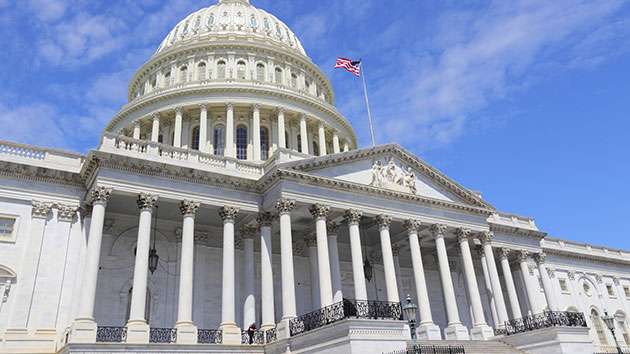
By LISA MASCARO, The Associated Press
WASHINGTON (AP) — The House voted Wednesday to send two articles of impeachment against President Donald Trump to the Senate, delivery set for a dramatic procession across the U.S. Capitol for only the third such trial in American history. Trump complained anew of a “hoax,” even as new details emerged about his efforts in Ukraine.
The charges were to be carried in a ceremony of pomp and protocol by lawmakers prosecuting the case, moving the impeachment out of Speaker Nancy Pelosi’s Democratic-run House to the Republican-majority Senate, where the president’s team is mounting a defense aiming for swift acquittal.
Wednesday’s mostly partly-line House vote to deliver the charges was 228-193, reflecting the deeply divided nation at the start of this presidential election year. It came one month after the House impeached Trump alleging he abused his presidential power by pressuring Ukraine to investigate Democratic rival Joe Biden, using military aid to the country as leverage. Trump was also charged with obstructing Congress’ ensuing probe.
“We are here today to cross a very important threshold in American history,” Pelosi said, addressing the House before the vote.
“This is what an impeachment is about,″ she said earlier, announcing the prosecution team. “The president violated his oath of office, undermined our national security, jeopardized the integrity of our elections.”
WASHINGTON (AP) — The House voted Wednesday to send two articles of impeachment against President Donald Trump to the Senate, delivery set for a dramatic procession across the U.S. Capitol for only the third such trial in American history. Trump complained anew of a “hoax,” even as new details emerged about his efforts in Ukraine.
The charges were to be carried in a ceremony of pomp and protocol by lawmakers prosecuting the case, moving the impeachment out of Speaker Nancy Pelosi’s Democratic-run House to the Republican-majority Senate, where the president’s team is mounting a defense aiming for swift acquittal.
Wednesday’s mostly partly-line House vote to deliver the charges was 228-193, reflecting the deeply divided nation at the start of this presidential election year. It came one month after the House impeached Trump alleging he abused his presidential power by pressuring Ukraine to investigate Democratic rival Joe Biden, using military aid to the country as leverage. Trump was also charged with obstructing Congress’ ensuing probe.
“We are here today to cross a very important threshold in American history,” Pelosi said, addressing the House before the vote.
“This is what an impeachment is about,″ she said earlier, announcing the prosecution team. “The president violated his oath of office, undermined our national security, jeopardized the integrity of our elections.”
Trump’s trial will be only the third presidential impeachment trial in U.S. history, and it comes against the backdrop of a politically divided nation in an election year.
The managers are a diverse group with legal, law enforcement and military experience, including Hakeem Jeffries of New York, Sylvia Garcia of Texas, Val Demings of Florida, Jason Crow of Colorado and Zoe Lofgren of California.
Two are freshmen lawmakers — Crow a former Army Ranger who served in Iraq and Afghanistan, Garcia a former judge in Houston. Demings is the former police chief of Orlando and Jeffries is a lawyer and member of party leadership. Lofgren has the rare credential of having worked on the congressional staff investigation of then-President Richard Nixon’s impeachment — he resigned before the full House voted on the charges — and then being an elected lawmaker during Bill Clinton’s.
All but one Democrat, Rep. Collin Peterson of Minnesota, voted to transmit the articles. All Republicans voted against. One former Republican-turned-independent, Rep. Justin Amash of Michigan, joined Democrats.
McConnell faces competing pressures from his party for more witnesses, from centrists who are siding with Democrats on the need to hear testimony and conservatives mounting Trump’s defense.
Senate Republicans signaled they would reject the idea of simply voting to dismiss the articles of impeachment against Trump, as Trump himself has suggested. McConnell agreed he does not have the votes to do that.
Sen. Susan Collins of Maine is leading an effort among some Republicans, including Mitt Romney of Utah, Lisa Murkowski of Alaska and Lamar Alexander of Tennesse e to consider Senate witnesses. She told reporters she was satisfied the rules will allow votes on that.
Romney said he wants to hear from John Bolton, the former national security adviser at the White House, who others have said raised alarms about the alternative foreign policy toward Ukraine being run by Giuliani.
Those four senators could force votes. Republicans control the chamber, 53-47, and are all but certain to acquit Trump. But it takes just 51 votes during the trial to approve rules or call witnesses. It also would take only 51 senators to vote to dismiss the charges against Trump.
Sen. Rand Paul of Kentucky and other Republicans want to subpoena Biden and his son, Hunter, who served on the board of a gas company in Ukraine, Burisma, while his father was vice president.
McConnell prefers to model Trump’s trial partly on the process used for Clinton’s impeachment trial in 1999. It, too, contained motions for dismissal or calling new witnesses.
McConnell is hesitant to call new witnesses who would prolong the trial and put vulnerable senators who are up for reelection in 2020 in a bind with tough choices. At the same time, he wants to give those same senators ample room to show voters they are listening.
—-
Associated Press writers Zeke Miller, Alan Fram, Matthew Daly, Andrew Taylor, Mary Clare Jalonick, Laurie Kellman, and Padmananda Rama contributed to this report.













